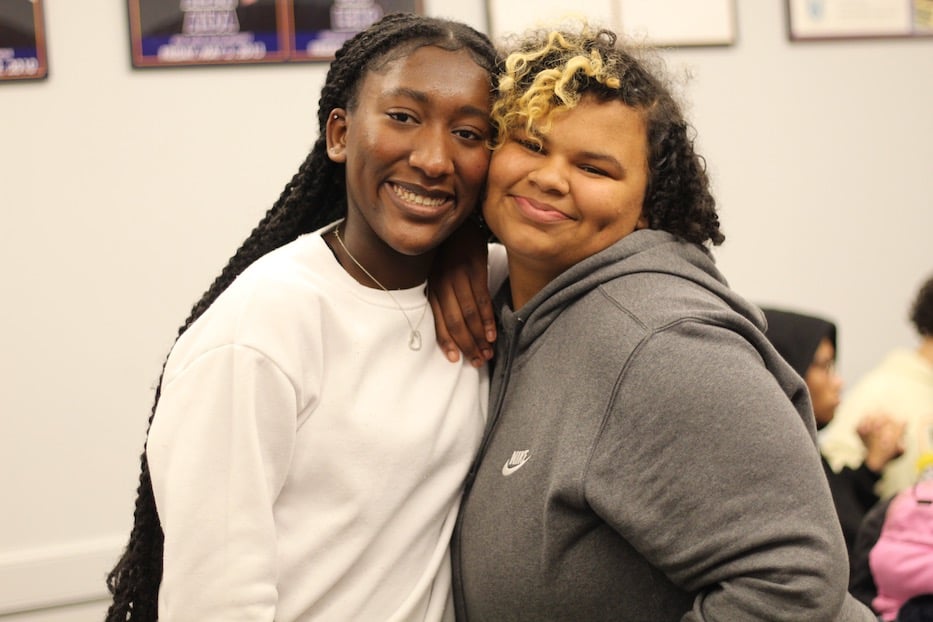
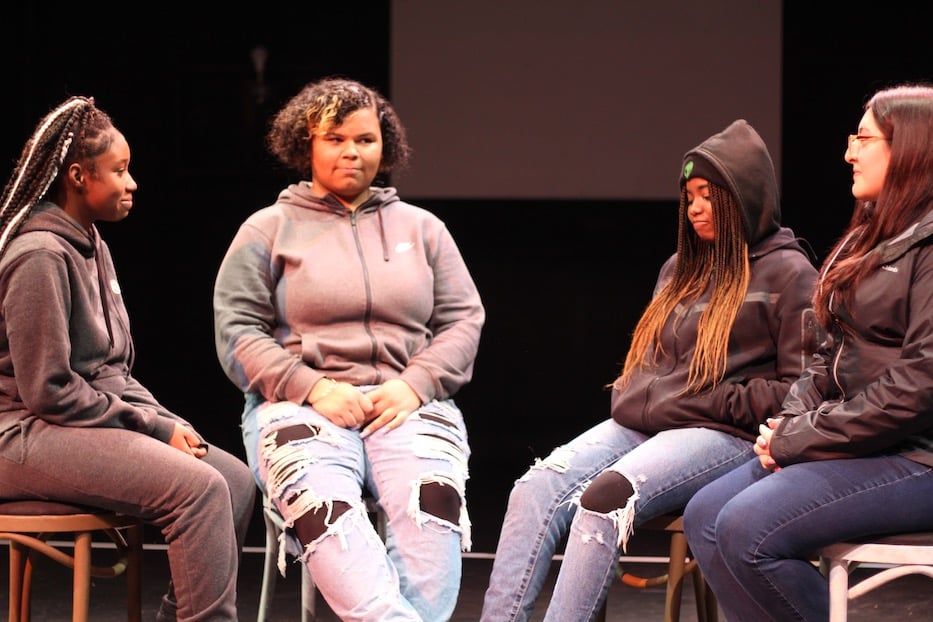
Top: Seniors Patience Christopher and Mikela Jones. Bottom: Students in action.
Ms. Blossom is listening to her students ponder over what they’ll be when they grow up. One wants to be a whale. Another, a ramen noodle. A third, a purple tree. “I want to be president of the world!” exclaims a fourth, and the future feels entirely possible. On the ground, Malek Alkhalawi is silent, forlorn.
“I don’t know what I want to be,” he says, and a listener can hear something catch in his throat. Ms. Blossom shrugs it off: he has time.
Alkhalawi is a student at Common Ground High School, where a class in devised theater is giving students a chance to talk about mental health, safety in and out of school, personal relationships and anxiety—and earn college credit in the process. A collaboration among Common Ground, Elm Shakespeare Company, and Southern Connecticut State University, it creates a vital window into students’ lived experiences—and gives them control of a narrative of which they are often left out.
Last Monday, students premiered their final project, Expect The Unexpected, for an intimate audience at the John Lyman Center for the Performing Arts at SCSU. Last Wednesday, they performed it again in back-to-back performances for the Common Ground school community. They credit Sarah Bowles, director of education at Elm Shakespeare, for helping them get there.
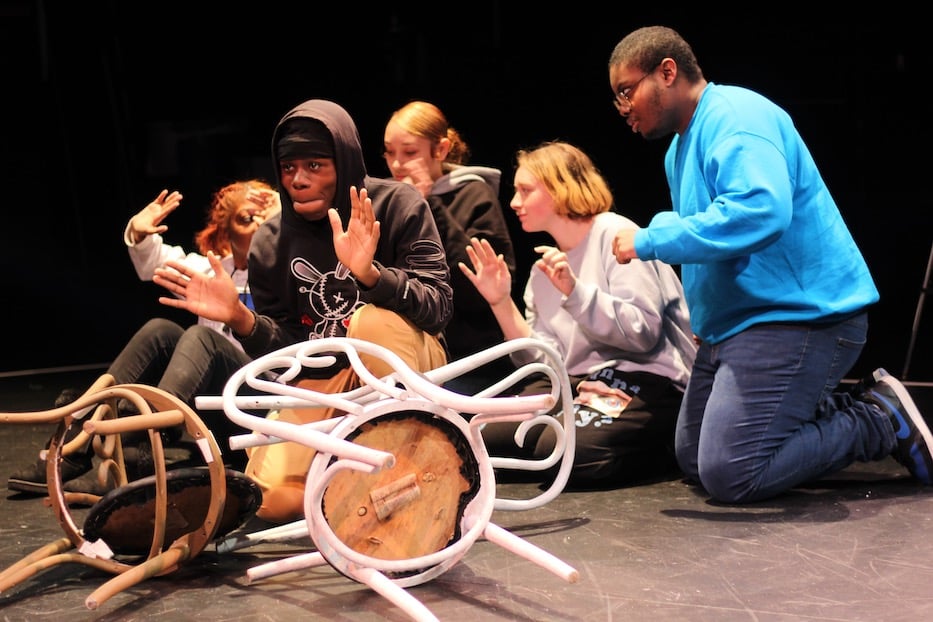
“I’ve never acted a day in my life,” said senior Patience Christopher, who added that she prefers to be behind the scenes. “The only performance I’ve done is playing the piano. But here I am. I feel accomplished that I made it this far. I gained public speaking skills. And here we are, about to present in front of the whole school.”
Set in the present, Expect the Unexpected unfolds in six overlapping vignettes, weaving a narrative thread from law enforcement and safety in the classroom to fraught and budding friendships, high school romance, chronic depression, college readiness, and deep existential fears for the future.
Based on a series of guided prompts, the lines sound realistic because they are: multiple sections of the script are lifted verbatim from discussions that students had with Bowles. The addition of simple, crisp choreography and minimal sound design——music played over the speakers, a lone drum beating from somewhere in the audience——turn it into a full performance. The audience is somewhere that is not this universe, but not not this universe either. 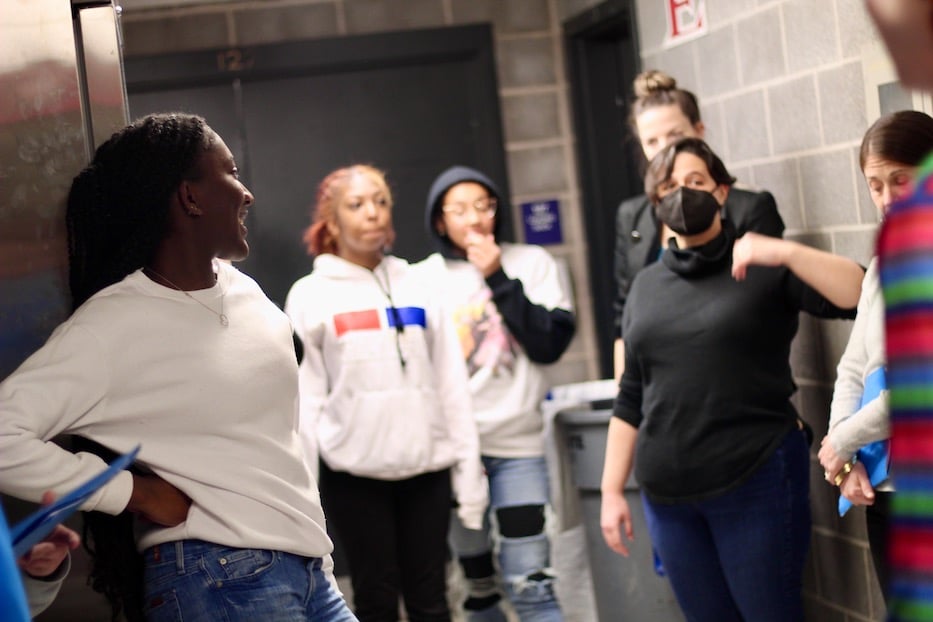
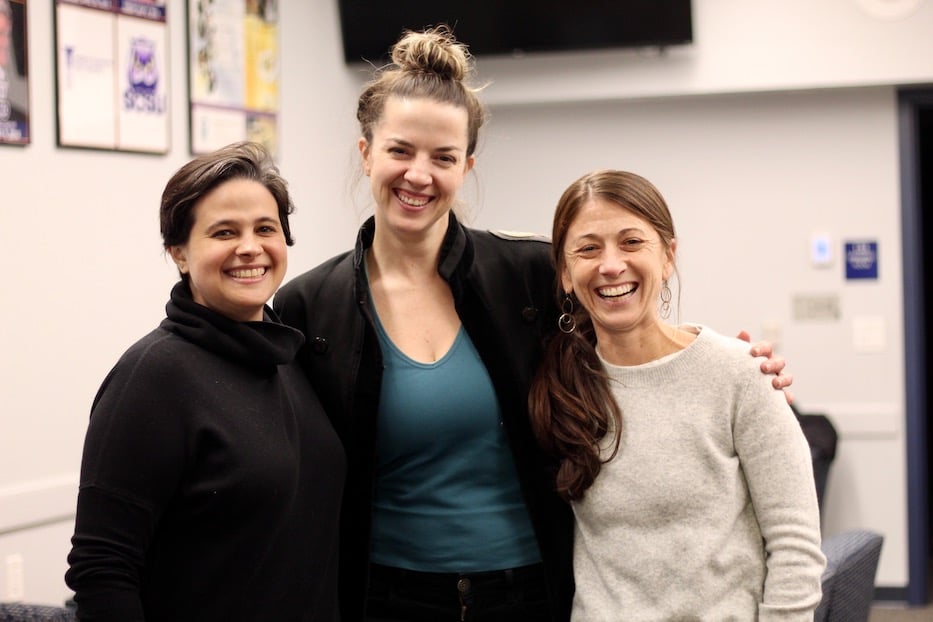
Stephanie Eiss, Sarah Bowles, Katy Finn.
“I was pretty astonished,” said Bowles, who brought in colleagues Katy Finn and Stephanie Eiss to work on the show, in a pep talk before the performance. “I was like, ‘Oh, damn. This is good. This is really good.’”
That energy comes from the students themselves. From the beginning of the show, actors are all the way in—and stay there for the entirety of the play. In one scene early in the show, they debate school safety in vague, broad and obtuse terms (“Protected,” “Calm,” “Relaxed”), a conversation that quickly narrows to their very real anxieties around a potential school shooter. The stress level rises in the theater, so thick it feels like someone could cut through it with a knife.
“Do you all feel safe in school?” sophomore James Stanley asks. On stage, the conversation stops for a moment. It’s possible to hear a pin drop. Then someone breathes, audibly.
“No,” responds senior Madison Acampora. It’s an opening. Within seconds, a fellow student mentions the number of glass windows in their classroom. Another maps out hiding spots and an escape route out of the school building and onto the school’s sprawling, green campus.
“I know every spot, every exit,” says Mariangeliz Arroyo, and it’s an instant gut punch.
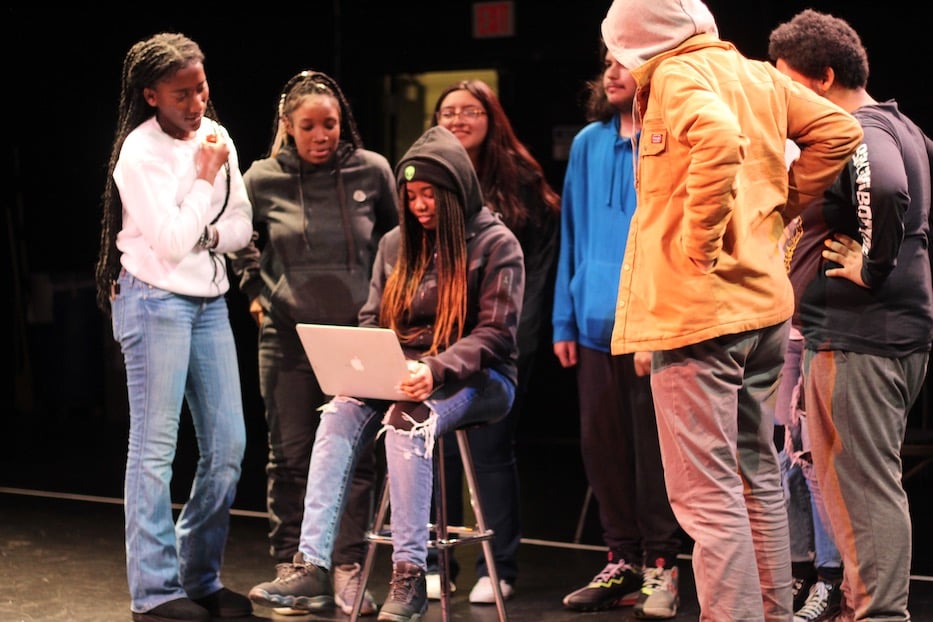
Many of these students were in first and second grade ten years ago, when a shooter walked into Sandy Hook Elementary School with a semiautomatic weapon and killed 20 children and six staff members. They are the ages those children would have been now, living in a country where bodies are more regulated than guns. When they pivot to the possibility of a zombie apocalypse, the sheer, mind-boggling level of absurdity feels right on time.
So too in a scene later in the show, as students weave their concerns around mental health and depression into their everyday interactions. Set at an upscale restaurant, four friends gather for a birthday party, conversation bubbling around the menu, the drinks, the possibility of clubbing later in the evening. Everyone pauses for an Instagrammable food photo, which doubles as a cheeky laugh line about the realities in which they (and the audience) live.
Depression creeps in so slowly it’s hard to notice at first: Tayzhana Hopkins asks for a side of white rice, then picks at her food. She’s quiet during the meal, struggling to engage. The frame freezes. She stands and faces the audience.
“I don’t want to be here. I wish I could put on a show but my emotions are coming through,” she says. “I don’t wanna ruin my friend’s birthday. I wish I could just enjoy myself.”
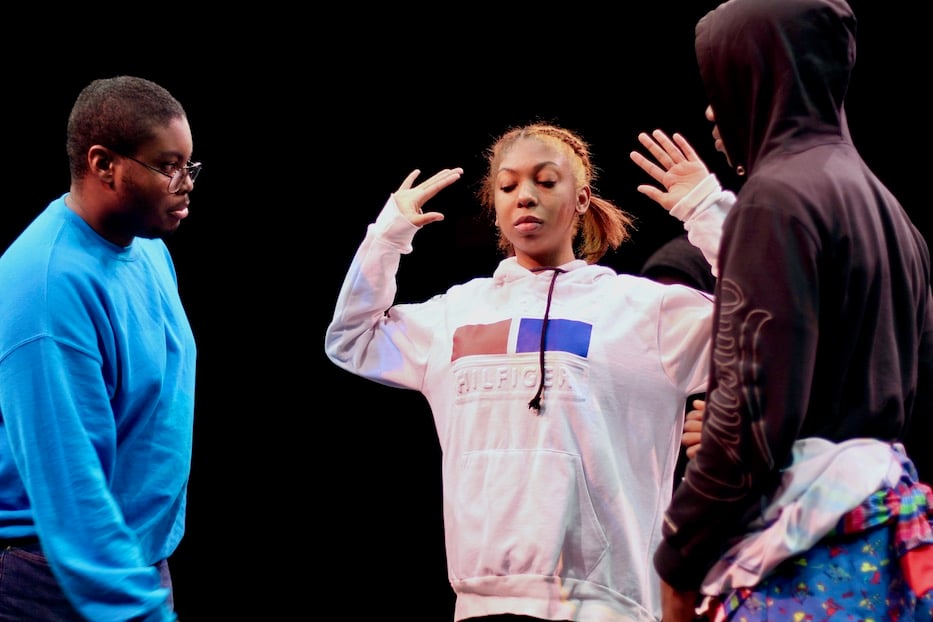
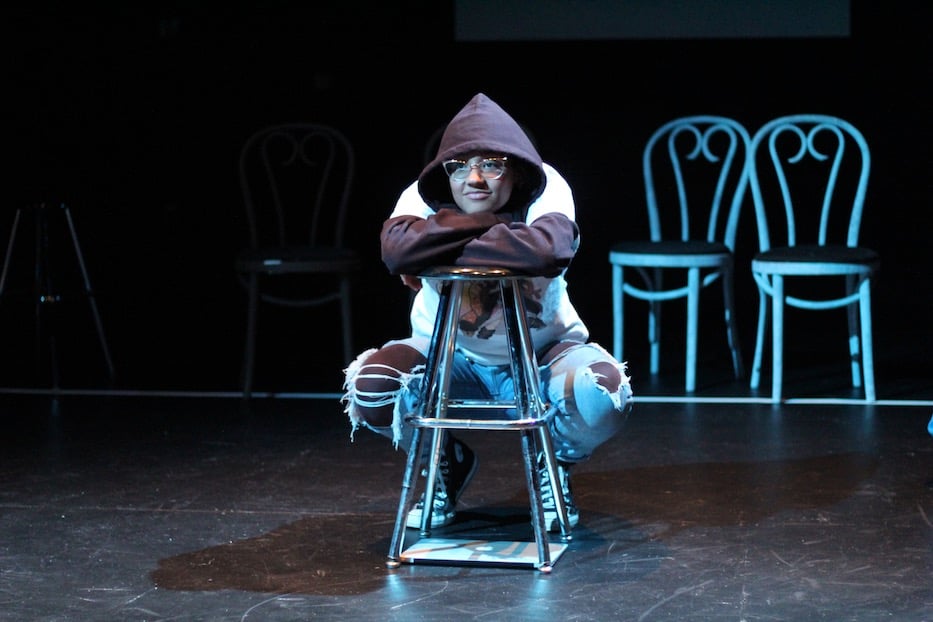
No topic is sacred, and the work is better for it. A student gets stood up on a date, and goes back to their friends with their tail between their legs. A group of freshman transfers makes a pact to be friends for all of high school, but their socioeconomic and academic realities get in the way. Friends struggle and slog through both college applications and college itself. Students school the adults in the room on the parameters of being a mandated reporter—including how a wrong move can put a young person’s life in danger.
It is a play that feels both written for the moment and long overdue. For audience members who have lived through high school—and those who are living through it now—it’s as effective as it is affecting in communicating the mind-bending mess of navigating adolescence in a pandemic, against a constant churn of both news and social media. This year, student voices have been conspicuously absent from debates that often dictate their future—around the city’s schools, math and reading levels, chronic absenteeism and an ongoing teacher shortage. To have them there, in their own words, is both straightforward and profound.
Both before and after the performance last Monday, several students said the class has helped them build self confidence and talk more openly about what it’s like to be in high school right now. Before this fall, sophomore James Stanley had never thought about theater as a way to express himself. After learning about the class from Joel Tolman, director of community impact and engagement at the school, he opted to take it instead of French.
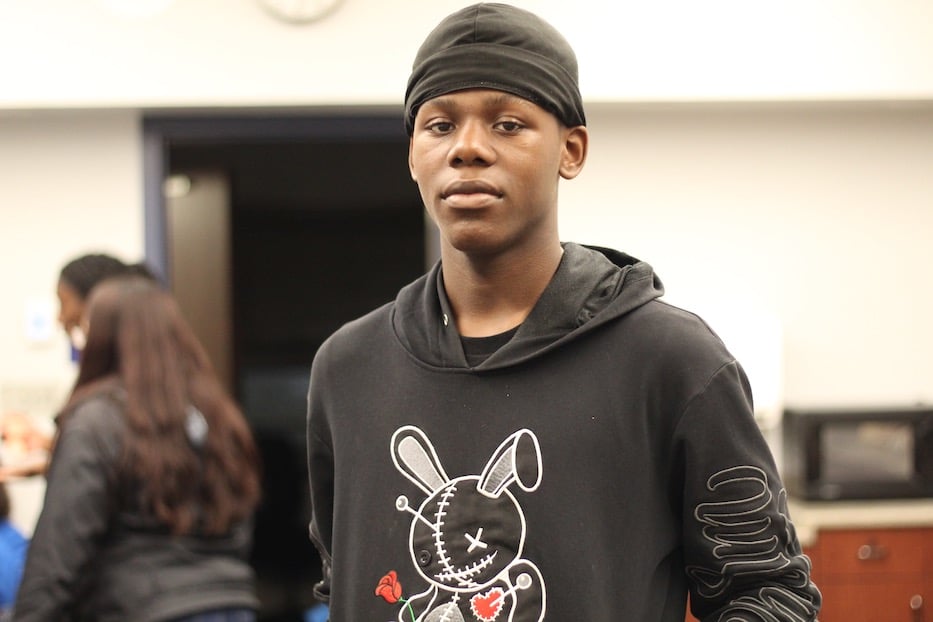
Sophomore James Stanley.
“I’m the youngest person in the group, [and] I kind of feel like the youngest sibling,” he said before stepping out onstage Monday. “At first, it felt awkward. I just kind of tagged along with what was happening. I kind of just, like, I get to be myself.”
Lauryn Gomes, a junior at the school, praised Bowles for bringing the class to Common Ground.
Growing up in New Haven, she fell in love with theater when she was still a student at Davis Academy for Arts & Design Innovation Magnet School, and pursued it at Betsy Ross Arts Magnet School before coming to Common Ground.
In high school, she didn’t know if that part of her life would disappear—so she was thrilled when the devised theater class became an option.
“It helps me feel comfortable in expressing myself,” she said. “I like the feeling of being engaged.”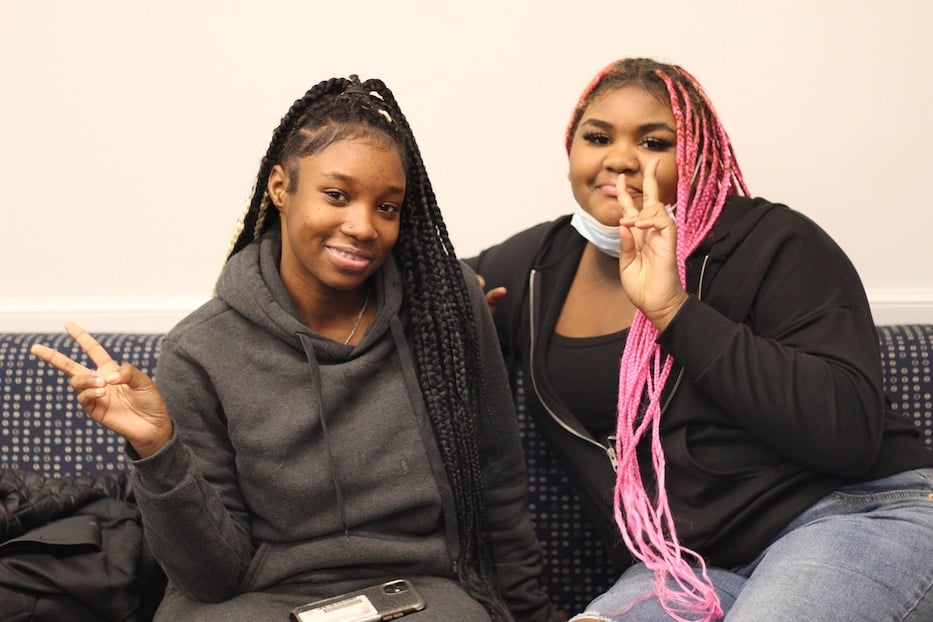
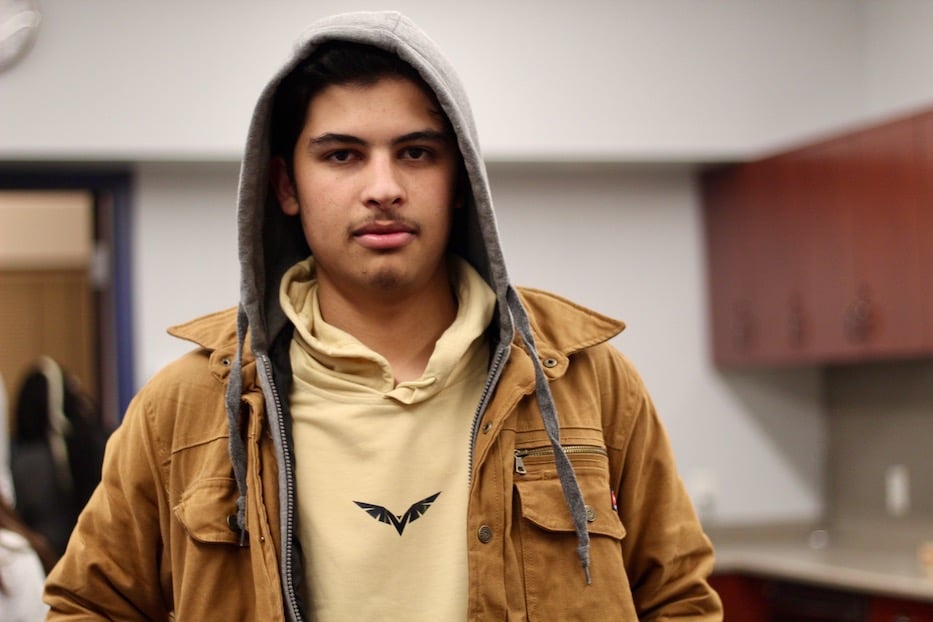
Top: Lauryn Gomes and Layla Wilkins. Bottom: Malek Alkhalawi
Alkhalawi, a senior who came to the U.S. with his family from Jordan in 2016, said he was surprised by how much fun the class was—and how much insight it gave him into what his classmates were thinking about and going through.
The oldest of five, Alkhalawi grew up in Syria and Jordan before coming to Connecticut. When he entered the eighth grade in New Haven, he faced racism from several of his classmates, he said.
“I want people to know that it is not easy in the beginning, but it gets better,” he said. “This, it’s a new experience for me.”